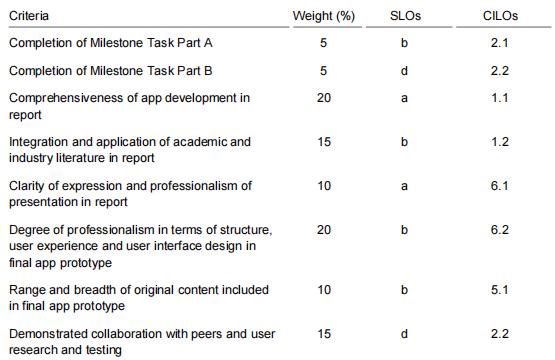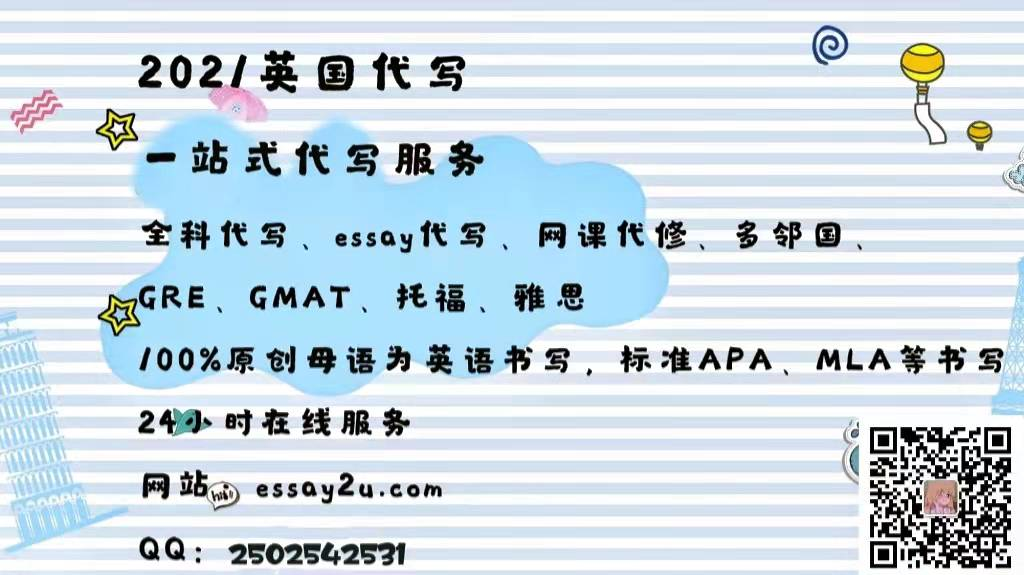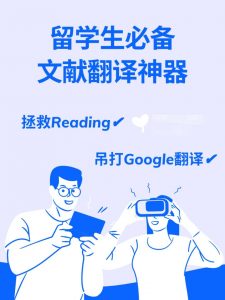SUBJECT OUTLINE
app代写 Please see the Teaching Staff page on Canvas for teaching team details including consultation times.Please email your tutor to make an appointment.
52686 Digital Publishing for Apps
Subject coordinator
Contact Hours (during session): Thursdays 9:00am-10:00am (please email to arrange a consultation).
Teaching staff
Please see the Teaching Staff page on Canvas for teaching team details including consultation times.Please email your tutor to make an appointment.
Subject description
This subject allows students to develop their conceptual and production skills in digital publishing, with a particular focus on the app environment. Students explore a range of challenges and opportunities in digital app development,including cultural and design issues concerning digital products developed for Indigenous communities or about Indigenous culture; UX and UI design; location-aware technologies and production methodologies. They develop conceptual and production skills in the context of new modes of storytelling, publishing and distribution that app and device formats make possible. Students learn to ideate, plan, design, prototype and iterate using industry-relevant techniques and tools. They apply rapid prototyping methods to develop app solutions to real world problems and enhance their digital production skills in design and prototyping using industry-relevant software.
Subject learning objectives (SLOs)
a.Communicate professionally
b.Plan, develop, design and produce digital apps
c.Understand how to develop apps around the needs of Indigenous communities
d.Collaborate effectively
Course intended learning outcomes (CILOs)
This subject engages with the following Course Intended Learning Outcomes (CILOs), which are tailored to the Graduate Attributes set for all graduates of the Faculty of Arts and Social Sciences:
- Act in a professional manner appropriate to communication industries (1.1)
- Apply theoretically informed understandings of communication industries to independent and collaborative projects across a range of media (1.2)
- Employ appropriate research and inquiry skills to independently gather, organise and analyse information across diverse platforms (2.1)
- Act as reflexive critical thinkers and innovative creative practitioners who evaluate their own and others’ work (2.2)
- Apply knowledge of Indigenous issues in professional practices and engage responsibly in communicating with and about Indigenous people and communities (4.1)
- Analyse and act ethically in the personal, political and professional contexts of civil society (5.1)
- Exemplify effective and appropriate communication in different communication industry contexts (6.1)
- Utilise digital literacy and production skills across a range of media (6.2)
Teaching and learning strategies app代写
Face-to-face classes incorporate a range of teaching and learning strategies including case study analysis,presentations, workshops and collaborative project development. These are complemented by preparatory work prior to attending classes using online resources such as websites and videos, and online technical skill development for certain software using digital resources. Initial classes focus on key conceptual, planning, platform and production issues relevant to digital publishing in a networked and app environment including workshops for ideation of prototypes. As the subject progresses, the focus shifts significantly to active learning via collaborative teamwork, workshops and in-class production where students develop digital publishing projects emerging from the earlier rapid prototyping.
Students receive both formative and summative feedback within the subject.Students gain early formative feedback during classes as their prototypes are developed and then later as they advance their prototype. During this phase, the feedback is focussed on concept and technical improvements and peer feedback through user testing. Students receive summative feedback in response to their submitted assessment items that is focussed on assessment outcomes. Summative feedback may also provide information on specific aspects of their submitted assessments,such as strategies for improvement, advancement of strengths, or comments on notable aspects of submitted work. It is provided in written form for all assessed work and will be published along with grades.
Content (topics)
Students explore the emergence of digital and mobile apps and networked devices as modes of cultural production.They learn and apply user experience and user interface design principles and approaches in a mobile device environment. Students examine cultural and design issues concerning digital products developed for and about Indigenous communities and culture through the application of Indigenous principles and protocols. They consider technological developments in mobile technology including location-aware technologies and social networking. They explore historical and contemporary approaches to developing digital media content including digital production and prototyping methodologies, structuring and wireframing digital content and app distribution standards, issues and challenges.
Program app代写
Week/Session Dates Description
Module 1/Week 1 w/c 20 Feb Introduction to Digital Publishing for Apps
This week you are expected to complete the Week 1 Orientation module on Canvas. There are a series of activities and readings designed to introduce you to the key concepts of the subject and the tools we will be using later in the session. These activities will need to be completed in preparation for our first seminar in Week 2.
Activities:
- Key concepts (Ubiquitous apps, digital inclusion, and UX/UI design
- Prototyping tools (Proto.io, Figma, Sketch, Adobe UD, Invision
Required Readings:
For weekly readings, viewings and pre-seminar activities, please go to our Canvas site.
Module 1/Week 2 w/c 27 Feb Cultural Fluency and Inclusive Design
This week we look at the concept of cultural fluency in design; designing for different cultures, intercultural design, and Western-Centric/US-Centric design. This week we begin working on our first assessment for the subject, where you will undertake a case study on an Australian Indigenous mobile app. app代写
Pre-Seminar Activities:
Students must complete the Pre-Seminar Activities before coming to class.
Seminar Topics Include:
– UX/UI design principles
– Cultural fluency
– US-Centric Design
– Cultural sensitivity
– Examining apps critically without judgement
– Introduction to A1
Module 1/Week 3 w/c 6 Mar Indigenous Mobile Apps
This week we will look at Indigenous mobile apps, cultural contents and cultural diversity in app formats and how apps have been designed for Australian indigenous communities or about indigenous culture.
Seminar topics include:
– Indigenous mobile apps
– Cultural design and ethical issues
– Working respectfully and effectively with Indigenous contents and communities.
Module 1/Week 4 w/c 13 Mar Indigenous Principles and Protocols
This week we will focus on unpacking the IPP document to better understand how to apply the principles and protocols to both our case study and real world situations.
Seminar topics include:
– Unpacking Indigneous Principles and Protocols app代写
– Preparing video presentations
– Final questions for A1
Module 2/Week 5 w/c 20 Mar Service Apps and Solving User Problems
This week we explore service apps and how apps do or don’t solve user problems or meet user needs. We ask the questions: why do you we always want to solve a problem with an app? Why are there so many bad apps out there? Is there really an app for everything?
Seminar topics include:
– Recap key UX/UI concepts
– Ideation, brainstorming and scoping of Prototype 1
– Intro to Assessment 2
Notes:
Assessment 1: Indigenous Mobile App Case Study is due by 5pm
Monday 20th March via Canvas.
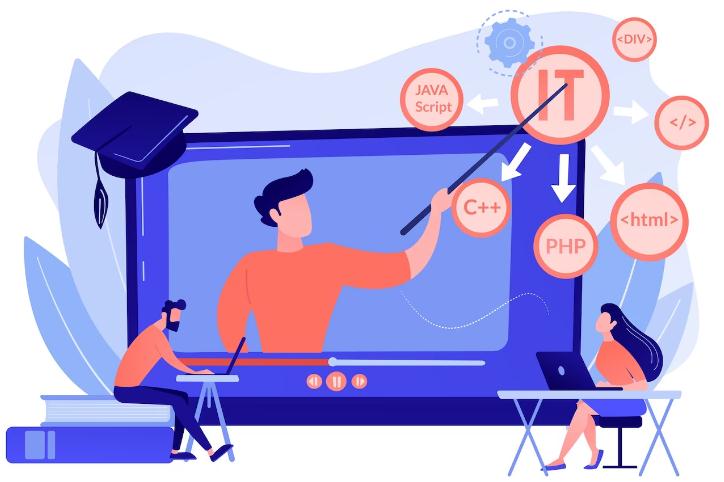
Module 2/Week 6 w/c 27 Mar App Development Methodologies app代写
This week we will learn app development methodologies including rapid application development, agile, and lean methodologies. We will utilise key activities involved including wireframing and IA mapping to plan our project structures.
Note: There are no scheduled classes this week. Instead, you are to use your time to develop your first prototype.
Online learning modules include:
– Agile and lean methodologies
– IA sitemaps and wireframing
– Technical development of app prototype
Module 2/Week 7 w/c 3 Apr Educational Possibilities of Apps
This week we look at educational apps and how apps can help educate society beyond the classroom. We also look at UI design more closely and think about the graphic design principles that have been translated across to app design (including screen composition and typography) and the challenges that arise when designing for small screens.
Seminar topics include:
– Education apps
– Life-long learning
– Accessibility and inclusive design
– Working with marginalised, minority and at-risk communities
– Ideation, brainstorming and scoping of Prototype 2
StuVac w/c 10 Apr StuVac
NOTE: There are no classes this week.
During this StuVac week, we want you to continue working on your second prototype and advancing your knowledge and skills working with the prototyping software.
Module 2/Week 8 w/c 17 Apr Interactive and Mobile Storytelling
This week we look at mobile and interactive storytelling and examine some contemporary interactive story apps. app代写
Seminar topics include:
– Location based technologies, apps, content and media
– Internative storytelling and narrative apps
– Apps as immersive storytelling platforms
– Ideation, brainstorming and scoping of Protoype 3
Module 3/Week 9 w/c 24 Apr Advancing a Prototype: User Research and User Needs Testing
This week you will take your chosen prototype and will begin to develop it further, with a focus on user needs research.
User Testing Workshop 1:
Students must attend the seminar this week to complete the user testing activities required as part of A2.
Notes:
Note: You must complete the A2 Milestone Tasks (outlined on Canvas)
Part 1 due Sunday 23rd April by 5pm.
Part 2 due Wednesday 26th April by 5pm.
Module 3/Week 10 w/c 1 May Advancing a Prototype: User Testing for Usability and Functionality app代写
This week you will continue to develop and refine your prototype with a focus on improving usability and functionality of your app.
User Testing Workshop 2:
Students must attend the seminar this week to complete the user testing activities required as part of A2.
Module 3/Week 11 w/c 8 May Advancing a Prototype: Final UX/UI Analysis
This week you will finalise the development of your prototype with a focus on conducting a final analysis of your app.
User Testing Workshop 3:
Students must attend the seminar this week to complete the user testing activities required as part of A2.
Module 3/Week 12 w/c 15 May Assessment 2 Drop-In
There are no classes this week, however the subject coordinator will be available online for any final questions regarding A2. You should use this week to complete your A2 app prototype and report. app代写
Notes:
Assessment 2: App Prototype Project is due by 5pm Monday 29th May via Canvas.
Assessment
Assessment task 1: Indigenous Mobile App Case Study
Objective(s): a, b and c
Weight: 40%
Task:
Working individually, students research, analyse and present a case study on an existing Australian Indigenous mobile app. Students analyse and critically reflect on the selected project, examining how Indigenous Australians and Indigenous culture are represented within the app. They reflect on the professional application of Indigenous principles and protocols within the chosen app. Students also critically reflect on the app’s target audience, genre, UX/UI, key content, functionality, accessibility, innovation or other relevant issues or features. The case study is to be presented as a video presentation with accompanying slides, submitted to Canvas. A PDF of the case study presentation text or voice over in the form of a summary of key points must be submitted to Turnitin.
Length: 6-8 minutes video presentation
Due: Week 5
Criteria linkages:
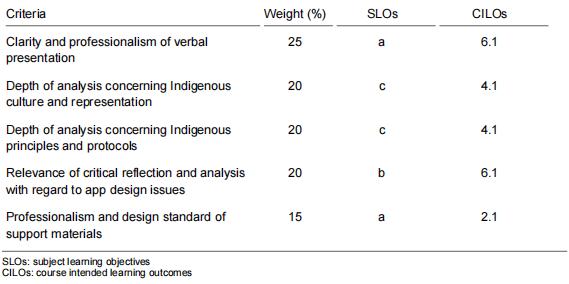
Further information: Further information is provided in the brief.
Assessment task 2: App Prototype Project app代写
Objective(s): a, b and d
Weight: 60%
Task:
Working individually, students advance one of their original app prototypes created in weeks 5-8 to a professional standard. Students work inside and outside class to develop the project using classes to report on progress, gain formative feedback, participate in user testing, provide support and feedback to others and undertake technical development. They generate original content and use appropriate software and assets to create their apps. Technical specifications and delivery requirements will be provided, and content or genre restrictions may apply to this assessment item.
Students submit their final app prototype with a report that provides:
- A project overview that details the project’s synopsis, problem identification, genre, unique value proposition, users and audiences, key content, and functionality.
- Background research that includes a competitor and market analysis.
- Ideation documentation that demonstrates the project’s concept development, methodology utilised, UX flow charts, screen wireframes and mockups.
- Prototype testing documentation that demonstrates user testing and creative and technical development. app代写
- Final pitch materials including app store requirements.
Students must submit their Milestone Task (Parts A and B) by the deadlines in order to receive marks for this component.
Students are expected to include an Appendix providing evidence of peer collaboration and any additional concept diagrams, wireframes or supporting documentation not included in the body of the report.
Length: 2000 words + final app prototype
Due: Final Assessment Period
Criteria linkages:
SLOs: subject learning objectives
CILOs: course intended learning outcomes
Further information: Further information is provided in the brief.
Required texts
There are no required texts for this subject. Required readings will be available via UTS Library and the online UTS site.
References
Garrett, J. (2011). The Elements of User Experience: User-Centred Design for the Web (2nd ed.). New Riders.
Goggin, G. (2011). Ubiquitous apps: politics of openness in global mobile cultures. Digital Creativity 22(3), 148-159.DOI: 10.1080/14626268.2011.603733
Hartson, R. & Pyla, P. (2018). The UX Book: Designing a Quality User Experience (2nd ed.). Morgan Kaufmann.
Krug. S. (2013). Don’t Make me Think, Revisited: A Common Sense Approach to Web and Mobile Usability (3rd ed.).Pearson Education.
Levin, M. (2014). Designing Multi-Device Experiences: An Ecosystem Approach to Creating User Experiences AcrossDevices. O’Reilly.
Lupton, E. (2014). Type on Screen: A Critical Guide for Designers, Writers, Developers, and Students. Princeton Architectural Press.
Mendoza, A. (2013). Mobile User Experience: Patterns to Make Sense of it All. Morgan Kaufmann.Neill, T. (2014). Mobile Design Pattern Gallery: UI Patterns for Smartphone Apps, O’Reilly. app代写
Neilsen, J. & Budiu, R. (2013). Mobile Usability. New Riders.Perea, P., & Giner, P. (2017). UX Design for Mobile: Design Apps that Deliver Impressive Mobile Experiences (1st ed.). PACKT Publishing.
Rieser, M (Ed). (2011). The Mobile Audience: Media Art and Mobile Technologies. Rodopi.
Tomisch, M., Wrigley, C. & Borthwick, M. (2018). Design. Think. Make. Break. Repeat: A Handbook of Methods. BIS Publishers.
Unger, R. & Chandler, C. (2012). A Project Guide to UX Design: For User Experience Designers in the Field or in the Making (2nd Ed.). New Riders.
Assessment: faculty procedures and advice
Refer to the faculty’s Student Study Guide for information about assessment, special consideration, student
misconduct and referencing requirements.
Academic integrity
Students are advised that academic integrity is required by the Student Code of Conduct. Suspected incidences of
plagiarism or other academic misconduct will be referred to the University. Students are advised to complete the
module on Academic Integrity under the General Resources tab on the subject online site to make sure they are aware
of their responsibilities and how to avoid plagiarism. More information about Academic Integrity can be found here.
Support
The Accessibility and Financial Assistance Service
The Accessibility Service can support students with disabilities, medical or mental health conditions, including temporary injuries (e.g., broken limbs). The Accessibility Service works with Academic Liaison Officers in each Faculty to provide ‘reasonable adjustments’ such as exam provisions, assistive technology, requests and strategies for managing students’ studies alongside their health condition. If they are unsure whether they need assistance, the Accessibility Service recommends getting in touch early so that they can provide advice on how the service can assist.Make an appointment with an Accessibility Consultant (AC) on +61 2 9514 1177 or [email protected].
The Financial Assistance Service can assist students with financial aspects of life at university, including Centrelink information, tax returns and budgeting, interest-free student loans and grants to assist with course-related costs.Check eligibility and apply online and make an appointment on +61 2 9514 1177 or [email protected]. app代写
Statement on copyright
Teaching materials and resources provided to students at UTS are protected by copyright. Students are not permitted to re-use those for commercial purposes (including in kind benefit or gain) without permission of the copyright owner.Improper or illegal use of teaching materials may lead to prosecution for copyright infringement.
Statement on plagiarism
UTS takes any form of academic misconduct very seriously. The policies and guidelines regarding plagiarism and academic integrity are enforced in this subject.
Students are strongly advised to read and familiarise themselves with the university’s advice on academic integrity,plagiarism and cheating.
Self-plagiarism app代写
Students are not permitted to submit work that they have previously submitted.
Statement on intellectual property
The University does not assert ownership of Intellectual Property created by students except under certain conditions.See the Intellectual Property Policy for more information. Under Rule 3.9 of the Student Rules, UTS reserves the right to retain students’ assessment works created as part of this subject for teaching purposes in UTS award courses and in UTS short forms of learning, advertising and promotion, including for the UTS Website and UTSOpen, and as otherwise permitted under Rule 3.9.
Students have the right to consent or object to their work being used for teaching case study material, exhibition,publication or promotions, and can complete the consent component of the assessment cover page. The university will assume consent if the student has not specified a preference. UTS will use reasonable efforts to ensure that students are credited for their work where used for the purposes described. The student assessment work will only be retained by the University until it is no longer needed for explicit teaching, advertising and promotion or in order to comply with its reporting and legal obligations. Students with access to this subject outline are deemed to have had sufficient notice of their rights and the University’s policy on intellectual property.
Statement on UTS email account
Email from the University to a student will only be sent to the student’s UTS email address. Email sent from a student to the University must be sent from the student’s UTS email address. University staff will not respond to email from any other email accounts for currently enrolled students.
Disclaimer
This outline serves as a supplement to the faculty’s Student Study Guide. On all matters not specifically covered in this outline, the requirements specified in the guide apply.This outline was generated on the date indicated in the footer. Subsequent minor changes may have been made.
更多代写:经济学Midterm代考 雅思代考 金融网课代上价格 历史Essay的写作思路 金融工程论文代写 英国cs程序代做
合作平台:essay代写 论文代写 写手招聘 英国留学生代写
